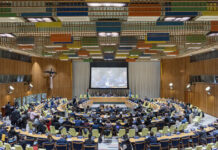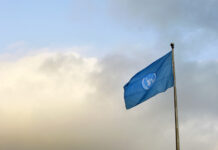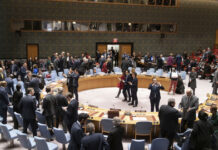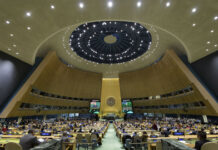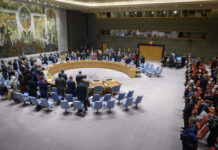Photo credit: DiasporaEngager (www.DiasporaEngager.com).
Yevgen Korniychuk, Ukraine’s Ambassador in Tel Aviv, has found himself in a rare position since Oct. 7, when Hamas terrorists unleashed a bestial pogrom in southern Israel, as the diplomatic representative of one country caught in a war of existential survival dispatched to a second country that is engaged in a war with similar stakes.
“Yes, it’s a strange feeling,” Korniychuk told The Algemeiner during an extensive telephone interview on Tuesday, emitting a short laugh. Having served in Israel for more than two years — a period covering the brutal Russian invasion of his country in Feb. 2022 — Korniychuk has encountered several moments of frustration in his bid to win stronger diplomatic and military support from Jerusalem as Ukraine confronts its Russian enemy. “As the ambassador, I have to remain optimistic,” he reflected during a previous interview in Jan. 2023 with this publication. “If I am pessimistic, I may as well retire.”
Korniychuk firmly believes that Israel and Ukraine are natural allies, even if the Israeli government, nervous of poking Moscow, has shied away from saying so explicitly. In part, it’s because both countries are facing the same enemy in the shape of Iran, which has been providing the devastating Shahed drones used by the Russians to attack Ukrainian population centers at the same time as backing proxy terrorist groups, among them Hamas and Hezbollah, dedicated to Israel’s destruction. “Russia, Iran, and the Iranian proxies are the axis of evil,” Korniychuk emphasized.
He also counsels that Israel cannot trust Russian President Vladimir Putin’s regime, pointing to the long and violent history of Russian antisemitism and the key role Russia has played in spreading antisemitic conspiracy theories, dating back to the fabricated “Protocols of the Elders of Zion” unveiled by the Tsarist secret police in 1903. “The Russian regime is always looking for the Ukrainian roots of whatever problems they have,” Korniychuk said, referring to Russia’s patently false claim that the democratic government in Kyiv was responsible for last weekend’s attack by ISIS terrorists on a crowded theater in Moscow. “But the truth is that they will be looking for the Jewish roots also. When Russia goes through bad times, they target the Jews and then the other minorities; if you look at Russian history in the 19th and 20th centuries, that was always the case.”
In the last few days, Russian representatives have unwittingly proved Korniychuk’s point, with Kremlin spokesperson Dmitry Peskov ridiculing Ukrainian President Volodymyr Zelensky, in the wake of the ISIS attack, as a “peculiar kind of Jew.” Putin himself has also deployed similar rhetoric, describing Zelensky as a “disgrace to the Jewish people” in comments last June. All this reflects, as Korniychuk remarked, the ultranationalist ideology reigning in Moscow which holds that those Jews living outside of Russia’s orbit have been corrupted by capitalism and the desire to turn a quick profit — in contrast to the “traditionalist” Jews of the east, to use the term of Russian ideologue Alexander Dugin, whose values are supposedly aligned with those espoused by their Russian hosts.
Korniychuk recounted a meeting with officials at the Israeli foreign ministry right before our conversation, in which he had made the same substantive points. The realist calculus deployed by the Israelis in assessing Russian actions — “putting themselves in Russia’s shoes,” as Korniychuk put it — frustrates him, because what Russia is doing “is not rational.” Similarly, talk of Russian “escalation” sounds empty to Ukrainian ears. “We don’t see any further escalation because we’ve already had a full-scale war for the last two years,” the ambassador observed. True, he added, the Russians “could decide to use nuclear weapons, but even then, our resistance will not stop. We believe that anything could happen and we have to be ready for everything, as do our European neighbors. The big European states — France, Germany, Italy — now understand what they are dealing with.”
Another area of Ukrainian-Israeli common interest outlined by Korniychuk concerns the efforts within the US Congress to pass a $95 billion aid package for Israel, Ukraine, and Taiwan. While the measure won Senate approval last month, it has been stalled in the House of Representatives by far right Republican supporters of former President Donald Trump, many of whom have followed Trump’s lead in advocating that Ukraine surrender to Russian conquest. Bipartisan attempts to approve the package have examined other methods for funneling the aid, for example in the form of a loan, but while the deliberations go on, Ukrainian forces are running perilously short of ammunition and other basic materiel.
Korniychuk has been advocating for a united lobbying effort in Washington, DC, to break the deadlock. “This is money that will be spent in the US on ammunition and anti-missile defense, so it’s a win-win for the US,” he asserted. “Israel is experiencing the same problems with ammunition, so this is why it’s important for us to join forces.” He remains hopeful that Ukrainian advocacy groups will work with AIPAC, the main pro-Israel lobby organization in the US, which in the recent past has hailed closer Ukrainian-Israeli cooperation in the face of the Russian threat.
In that regard, Korniychuk also stresses that Putin’s regime maintains close ties with Israel’s deadliest adversaries, pointing out that Moscow has warmly received delegations from Hamas and other radical Palestinian factions, as well as Hezbollah and the rebel Houthis in Yemen, who have caused havoc in the Red Sea with intentional attacks on Western — but not Russian or Chinese — cargo vessels since Oct. 7. As a diplomat he said, he has not seen any intelligence to suggest that Russia had advance knowledge of the Oct. 7 pogrom, but “we have enough evidence of their close ties and relations and support of those groups, so we can reach the appropriate conclusions.”
Korniychuk emphasized that since Oct. 7, he had moderated his criticisms of the Israeli government’s reluctance to ally more openly with Ukraine. “We are not talking about a ceasefire. We have been attacked brutally by Russia, like Hamas attacked Israel. We support the right of Israel to self-defense,” he said. At the same time, he noted with regret that the “excessive loss of civilian life” in Gaza meant that Israel was “losing the propaganda war.”
“I understand the difficult position [the Israelis] are in at the moment, and we are cooperating now on a very good level in terms of security,” he said. “These are difficult times, and we don’t get to choose our circumstances. If we achieve even modest goals, that is something, given the situation in which we find ourselves.”
Source of original article: World – Algemeiner.com (www.algemeiner.com).
The content of this article does not necessarily reflect the views or opinion of Global Diaspora News (www.GlobalDiasporaNews.com).
To submit your press release: (https://www.GlobalDiasporaNews.com/pr).
To advertise on Global Diaspora News: (www.GlobalDiasporaNews.com/ads).
Sign up to Global Diaspora News newsletter (https://www.GlobalDiasporaNews.com/newsletter/) to start receiving updates and opportunities directly in your email inbox for free.




